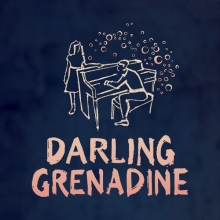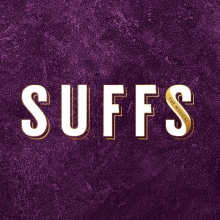
Full Synopsis
Act One
Mark, a filmmaker and the show's narrator, is spending a cold Christmas Eve in the Lower East Side industrial loft that he shares with his musician roommate, Roger. They receive several phone calls ("Tune Up / Voice Mail #1"). The first is from Mark's mother, consoling him over the loss of his girlfriend, Maureen, a performance artist, to JoAnne, a Harvard Law School graduate. The second is from their friend, Tom Collins, who is detained by muggers. The last is from their landlord, Benny, demanding the rent. The power blows... and so do Roger and Mark's tops ("Rent").
Outside, Collins is reeling from the mugging. He is comforted by Angel, a street musician, who offers him a helping hand ("You Okay, Honey?"). Both HIV+, Angel and Collins head out for a night on the town and a life support meeting.
In response to a call for help, Mark sets out for the lot where Maureen is performing a protest against Benny's eviction of the homeless from a nearby lot. He urges Roger to come along, but he refuses. As Mark reports, Roger has not left the apartment in six months. He is still reeling from the suicide of his girlfriend, who slashed her wrists upon learning that she had AIDS. Roger tries to write a song but the only melody he finds is "Musetta's Waltz" from Puccini's La Boheme ("One Song Glory").
Mimi, an S&M dancer who lives below Mark and Roger, knocks with a request: "Light My Candle." The attraction between her and Roger is immediate, but Roger shies away and shows her the door. Mimi knocks again; she has lost her stash. Roger helps her look, and Mimi eventually finds it – in Roger's back pocket.
As Joanne wrangles with the sound equipment for Maureen's performance, her parents leave her "Voice Mail #2," pleading with her to come to her mother's confirmation hearings in Washington. Collins arrives at the loft with a bag full of goodies. This includes Angel, transvested into Angel Dumott Shunard and gloriously arrayed in his Christmas finest – wig, glitter and platform pumps. In "Today 4 U," Angel explains how he earned $1,000: a wealthy woman hired him to play the drums until her neighbor's yappy Akita barked itself to death.
Benny enters with a proposal ("You'll See"): if Mark and Roger stop Maureen's protest, he will forgo the rent. He entices them with plans for Cyber Arts, a state-of-the-art, multimedia studio that will realize all of their dreams. Unsuccessful, Benny leaves. Mark, Collins and Angel try to coax Roger into coming to the life support meeting with them, but he refuses.
Mark finally reaches the lot where Maureen will perform her protest. He encounters Joanne, still struggling with the sound equipment and the many demands that Maureen makes upon her. Mark offers help. Although they dreaded meeting, they have a lot in common ("Tango: Maureen"). Once he finishes, Mark joins Angel and Collins at the "Life Support" meeting.
In her apartment, Mimi dresses and appeals to an imaginary Roger to take her "Out Tonight." She barges into his apartment and continues her appeal to Roger himself but, after a passionate kiss, he vehemently rejects her. They fight, her words blending with the affirmation of the support group that emphasizes the importance of living the moment ("Another Day"). A young man from the support group asks quietly, "Will I lose my dignity / Will someone care?" ("Will I?"). His thoughts and fears are echoed by each member of the community. The thoughts are Roger's, too, and he decides to go outside.
After the meeting, Mark, Angel and Collins roam the lot and rescue a homeless woman from the taunts and nightsticks of the neighborhood cops ("On the Street"). Discouraged by life in New York, the three dream of opening up a restaurant in "Santa Fe." Alone at last, Angel and Collins finally express their love for each other ("I'll Cover You"). Joanne, meanwhile has her hands full juggling work, parents, and the ever-demanding Maureen... all over the phone ("We're Okay").
The scene changes to St. Mark's Place, where vendors hawk their wares to the bohemians of the East Village ("Christmas Bells"). Angel buys a new coat for Collins. Mark finds Roger, who spots Mimi looking for drugs. Roger apologizes and asks her to dinner. Just as the snow begins to fall, Maureen finally appears on her motorcycle to perform her protest, "Over the Moon."
Following the protest, all convene at the Life Café, including Benny, who announces that Bohemia is dead. Thus ensues a makeshift mock-wake that quickly segues into a celebration of "La Vie Boheme." During the song, Benny confronts Mimi and threatens to reveal their past affair to Roger. Beepers go off to remind the revelers to take their AZT. Roger and Mimi each discover that the other is HIV+. Frightened and excited, they vow to be together ("I Should Tell You").
Joanne has been sent back to the lot by Maureen several times to check on the equipment. She finally rebels, telling Maureen that their relationship is over and announcing a riot in the lot: Benny has padlocked the building and called the cops, but the homeless are standing their ground... and mooing. The artists rejoice, the riot continues, and Roger and Mimi share a small, lovely kiss.
Act Two
The second act begins with the company posing the question, "How do you measure a year in the life?" ("Seasons of Love"). It is one week later, New Year's Eve, and Mark, Roger, Mimi, Maureen, Joanne, Angel and Collins are having a breaking-back-into-the-building party ("Happy New Year"). Once inside, Mark listens to one more phone message from his mother in Scarsdale as well as one from Alexi Darling, a tabloid TV producer who is salivating over his footage of the riot ("Voice Mail #3"). Benny crashes the party, angering Roger and alienating Roger from Mimi. Dejected, Mimi wanders outside and into the welcoming arms of her drug dealer.
Mark fast-forwards to Valentine's Day. Roger and Mimi are still together. Angel and Collins could be anywhere. Maureen and Joanne are still rehearsing another show, but it is not going well ("Take Me or Leave Me").
The company reprises "Seasons of Love," and time marches forward again into spring. Roger and Mimi have a fight, and Roger walks out. Alone, Mimi reflects on what life would be like without Roger ("Without You"). At the same time, Collins nurses a sick Angel; Maureen and Joanne reconcile, as do Mimi and Roger.
At the end of the summer, Alexi is still courting Mark for her TV show ("Voice Mail #4"). Roger and Mimi, unsatisfied by love's complications, break up, as do Maureen and Joanne. Angel dies. At a memorial service, his friends remember his spirit. Collins remembers his love ("I'll Cover You – Reprise").
Outside of the church, Mark phones Alexi to accept the job. Mark ponders how life has changed since last year as he recalls the joys of that one night last Christmas ("Halloween"). As the mourners leave the church, Mimi confirms that Roger has sold his guitar and is leaving town. Roger confirms that Mimi is now with Benny. A fight erupts among Roger, Mimi, Maureen, Benny and Joanne. Collins interrupts them with the sorrowful reality that the family is breaking up. Joanne and Maureen reunite. Mimi and Benny leave.
Mark tries to convince Roger to stay in New York to face his pain and the fact that Mimi is very sick. Roger attacks Mark, accusing him of hiding from his feelings. Mimi enters, having overheard the entire angry exchange, and bids Roger farewell ("Goodbye, Love"). Roger leaves town. Mimi turns to Mark for help. Benny offers one helping hand to Mimi and extends the other to Collins to help him pay Angel's funeral expenses. Mimi refuses the help and flees. Collins accepts and he and Benny go out for a drink.
Mark considers the events and faces the last year, as does Roger, who is on his way to Santa Fe. Roger begins to discover his own song, and Mark turns down the television job to finish his own film ("What You Own").
Roger's mom, Mark's mom, Mimi's mom and JoAnne's father all wonder where their children are ("Voice Mail #5"). Back at the loft, Mark tells us again that it's Christmas and that he now has a rough version of his film, which he's going to show tonight. Roger has returned with his written song but cannot find Mimi. Collins enters with money that he has gotten from an ATM, rewired to give money to anyone with a special code. The password? A-N-G-E-L.
Maureen and Joanne suddenly arrive, holding Mimi, whom they found collapsed and near death in the park. Roger begs her not to die and sings for her the song that it has taken him all year to write, "Your Eyes". Mimi dies as Roger wails her name over a blast of Puccini's music. Suddenly Mimi awakens; it seems that a guardian Angel was watching over her.
The company joins in a reprise of the affirmation that love is all and that there is "no day but today" ("Finale").
Show History
Inspiration
Jonathan Larson had been a "starving artist," living the bohemian life for several years, when, in 1989, his friend and fellow struggling playwright, Billy Aronson, suggested a contemporary American version of Puccini's La Boheme. Instantly, Larson saw the possibilities of exploring AIDS, homelessness, sexuality and the struggle for art in an East Village setting. He envisioned a "Hair for the 90s" that could "bring musical theater to the MTV generation." Initially, Aronson and Larson developed Rent together, writing early drafts of the title song, as well as "Santa Fe" and "I Should Tell You." Eventually, the two parted ways amicably, and Larson continued to develop the show on his own.
Productions
Rent had several stages of development before it reached production. The first staged reading occurred in March of 1993. In January 1994, writer, Jonathan Larson, was awarded a Richard Rodgers Development Award, for which he had applied on the advice of his mentor and hero, Stephen Sondheim. The $45,000 prized helped finance a two-week workshop of Rent that took place in November of that year. Two of the people in the audience were up-and-coming producers, Jeffrey Seller and Kevin McCollum. Based on the strength of the workshop presentation, the two agreed to partner with the New York Theater Workshop to stage a full production the following year, where it officially opened on January 25, 1996.
Rent moved to Broadway's Nederlander Theatre on April 29, 1996, where it ran for twelve years and 5,123 performances. The success of the show led to several national tours and numerous foreign productions.
Cultural Influence
- In 2005, film director, Christopher Columbus, made a movie version of Rent, featuring many of the original cast members from the Broadway production.
- The final performance of Rent, on September 7, 2008, was filmed. Rent: Filmed Live on Broadway also included footage from the closing night celebration. It had a limited theatrical release in late September 2008 and was then released on DVD and Blu-ray.
- Rent originated the now common practice of Broadway Rush. The show's producers offered 34 seats in the front two rows of the orchestra for $20 each, two hours before the performance. Fans would camp out for hours in front of the Nederlander Theater in order to get the tickets. These fans became known as "Rent Heads."
Trivia
- If the real-life "back story" behind the phenomenon of Rent had been submitted to a Hollywood studio, most executives probably would have dismissed the script as "unbelievable:" A struggling composer spends years waiting tables and enduring frustration and rejection. Then, on the very night that his career is finally about to take flight, he inexplicably collapses and dies, never knowing the degree to which his work would eventually impact the theatrical world of which he so desperately wanted to be a part. Yet, as anyone who follows theatre is aware, this is precisely what happened to Jonathan Larson, the 36-year-old composer of Rent, who suffered a fatal aortic aneuryism on January 25, 1996, which was to have been the first Off-Broadway preview of Rent at the New York Theater Workshop.
- In the fall of 1992, Larson had a completed first draft, which he dropped off with a demo tape at the office of James Nicola, the Artistic Director of New York Theater Workshop, who agreed to stage a reading of the show. "What drew Jonathan and me together in a philosophical place was the belief in how tragic it was that pop music and theater music had gotten a divorce. I felt he was the first composer I had run into who had the possibility of doing something about it," Nicola said.
- Although the response to the music was overwhelmingly positive, it was clear that there were structural problems with the piece. Director, Michael Greif, was brought on board to begin to address some of these issues. As Greif recalled in The New York Times, "Jonathan had firm ideas and he loved battling them out with us, but there was give and take."
- The Broadway production of Rent grossed over $280 million.
- Since 1918, only eight musicals have been awarded the Pulitzer Prize for Drama – of those eight, six are MTI Musicals: Of Thee I Sing (1932), Fiorello! (1960), How to Succeed... (1962), Sunday in the Park with George (1985) Rent (1996) and Next to Normal (2010).
Critical Reaction
"What makes Rent so wonderful is not its hipness quotient, but its extraordinary spirit of hopeful defiance and humanity."
– The New York Times
"Rent is the best show in years, if not decades."
– Variety
"At last, a show that lives up to its hype! Rent is theatre at its best: passionate, exhuberant, uplifting, and joyous."
– Theatremania
Connect
Lucille Lortel Archives (Original)
Playbill Vault(Broadway Premiere)
Lucille Lortel Archives (2011 Revival)
Billing
- Book, Music, and Lyrics by
Requirements
Short Form Billing
| Music Supervision and Additional Arrangements | Musical Arrangements |
| Tim Weil | Steve Skinner |
| Original Concept/Additional Lyrics | Dramaturg |
| Billy Aronson | Lynn Thomson |
Video Warning
In accordance with the Performance License, you MUST include the following warning in all programs and in a pre-show announcement:ANY VIDEO AND/OR AUDIO RECORDING OF THIS PRODUCTION IS STRICTLY PROHIBITED.
Included Materials
| Item | Quantity Included |
|---|---|
| DIRECTOR'S SCRIPT | 1 |
| ENHANCED STUDY GUIDE | 1 |
| LIBRETTO/VOCAL BOOK | 22 |
| PIANO CONDUCTOR'S SCORE ACT 1 | 2 |
| PIANO CONDUCTOR'S SCORE ACT 2 | 2 |
Production Resources
| Resource |
|---|
| CUSTOMIZABLE SHOW POSTER |
| HOW DOES THE SHOW GO ON-10/CS |
| HOW DOES THE SHOW GO ON? |
| KEYBOARD PATCH SOLUTIONS |
| KEYBOARDTEK |
| LOGO PACK |
| LOGO PACK DIGITAL |
| LOGO TEES SIX-PACK ADULT LARGE |
| LOGO TEES SIX-PACK ADULT MEDIUM |
| LOGO TEES SIX-PACK ADULT SMALL |
| LOGO TEES SIX-PACK ADULT X-LARGE |
| LOGO TEES SIX-PACK ADULT XX-LARGE |
| LOGO TEES SIX-PACK CHILD LARGE |
| LOGO TEES SIX-PACK CHILD MEDIUM |
| LOGO TEES SIX-PACK CHILD SMALL |
| ORCHEXTRA |
| PERFORMANCE ACCOMPANIMENT RECORDING |
| PRODUCTIONPRO-DIGITAL SCRIPT/SCORE |
| REFERENCE RECORDING |
| REHEARSAL ACCOMPANIMENT RECORDING |
| REHEARSCORE APP |
| STAGE WRITE APPLICATION |
| SUBPLOT CUSTOMIZED SHOW POSTER |
| TRANSPOSITIONS-ON-DEMAND |
| VIRTUAL STAGE MANAGER |
STANDARD ORCHESTRATION
| Instrumentation | Doubling |
|---|---|
| AUDIO GUIDE | |
| BASS | |
| DRUMS | |
| GUITAR | |
| GUITAR 2 |




